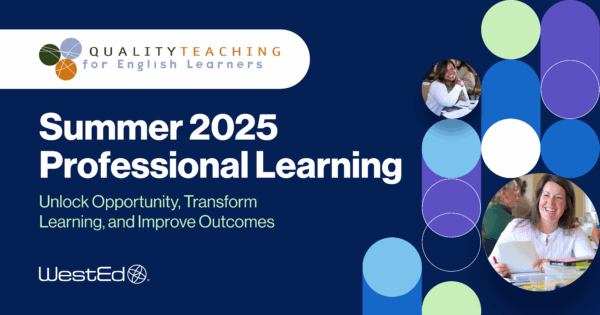
June 9, 2025
By Silvia DeRuvo and Cerelle Morrow
As the academic year concludes, educators supporting Multilingual Learners suspected of having disabilities* may find themselves approaching a strategic inflection point—one at which our response to the needs of these exceptional students can reshape our system for the better.
The culmination of months of instruction, intervention, and collaboration offers a moment to reflect on successes and challenges. Amid final assessments and transition planning, there’s an opportunity to consider how our practices have impacted our students and how we can enhance support for these students moving forward.
Intentional reflection serves as a powerful tool in helping us better understand what worked and what didn’t in our teaching practice. By posing meaningful questions, educators, specialists, and administrators can collaboratively identify effective practices worth sustaining and areas requiring growth.
This introspection not only acknowledges and celebrates achievements but also informs future, targeted professional learning, ensuring that support for dually identified students is both responsive and evolving.
To guide this reflective practice, consider the following questions centered on teaching, intervention, and collaboration:
- How effectively did we integrate evidence-based instructional practices in our core instruction?
- In what ways did our intervention systems support both academic and language development?
- How did we foster shared responsibility and collaboration across teams to ensure practices that reflected local communities happened across all tiers of instruction?
Integrating evidence-based instructional practices that support Multilingual Learner students and Multilingual Learner students with disabilities into core instruction is crucial for these students because it ensures that all students can access grade-level curriculum content.
When we effectively implement evidence-based practices, all students can access grade-level curriculum content while simultaneously developing their language skills.
In practice, this could involve coteaching models in which English language development specialists and content specialists or classroom teachers collaborate to design lessons that address both language and content standards.
Additionally, employing evidence-based practices such as scaffolding, visual supports, and quality student talk can make content more accessible and engaging for students.
Reflecting on how these opportunities for learning were implemented helps educators assess whether their instructional approaches are meeting the dual needs of Multilingual Learner students with disabilities and identify practices that could use some enhancement.
Intervention supports should be designed to address the intertwined nature of language proficiency, disability, and academic achievement. Effective tiered interventions are those that are responsive to individual student needs, are culturally relevant, and are inclusive of language development goals.
For instance, implementing a culturally and linguistically aligned multi-tiered systems of support (MTSS) framework that is appropriately scaffolded by the student’s English language proficiency level helps to ensure that students are receiving appropriate interventions and avoids a “one size fits all” approach.
Educators should deliver interventions in a manner that is accessible to students with disabilities, possibly involving assistive technologies or adapted materials.
Reflecting on the efficacy of these interventions can reveal strengths and gaps, guiding future improvements.
Collaboration among educators, specialists, and families is essential in creating inclusive environments for students. Shared responsibility ensures that all interest holders are engaged in supporting student success.
This might involve regular team meetings that include teachers, specialists, and administrators to discuss student progress, joint professional development sessions, and collaborative planning of instructional strategies.
Additionally, fostering a welcoming school culture requires ongoing reflection.
By evaluating the effectiveness of collaborative efforts, educators can identify successful practices and areas needing further development.
Reflective Time to Improve Student Outcomes
Providing time to reflect on these questions allows educators and decision-makers to critically assess their instructional practices and make informed decisions about professional learning and support structures, such as tiered interventions. This process is vital in promoting continuous learning and improving outcomes for our Multilingual Learner students and Multilingual Learner students with disabilities.
As we look back on the year, let’s celebrate our successes and embrace the insights gained through reflection. Together, we can continue to build educational environments where all students thrive.
Summer Professional Learning: Register for Supporting Multilingual Learners With Disabilities Summer Institutes
To further support this reflective journey, consider participating in the Enhancing Instruction for Multilingual Learners With Disabilities: Strategies for High-Quality Teaching, Interventions, and Collaboration. This professional development will showcase new strategies and opportunities to explore dual language instruction and the ways coteaching and collaboration can enhance instruction to meet both disability and language learning needs.
Virtual
Dates: July 22–24, 2025 (3 sessions)
Time: 9 a.m.–12:30 p.m. (PT)/12–3:30 p.m. (ET)
Learn more about our virtual offering and register →
In Person
Dates: June 24–26, 2025
Time: 8:30 a.m.–3 p.m. (PT)
Location: 1000 G St Ste 500, Sacramento, CA 95814
Learn more about our in-person offering and register →
* Includes Multilingual Learners suspected of having a disability and those students already dually identified as having a disability
About Our Experts
As a senior program associate on WestEd’s Special Education Policy and Practice team, Silvia DeRuvo provides technical assistance to improve policies and practices resulting in improved outcomes for Multilingual Learner students with disabilities.
Cerelle Morrow is a senior program associate on WestEd’s Quality Schools and Districts team where she works with schools and districts to design and implement professional learning to support Multilingual Learner students with disabilities.









